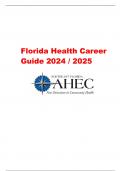Florida Health Career
Guide
, Introduction
● The Florida Health Careers guide is designed to help people explore career possibilities
in a wide array of health care fields and to provide a reference tool for librarians, career-planning
professionals, school guidance counselors and occupational specialists. On these pages, health
careers are organized into 16 categories by general profession type, and within each category the
careers are grouped in alphabetical order. Each career page contains the following information.
● Job Description...is an overview of duties and responsibilities of a particular occupation.
Responsibilities of workers in the same occupation will vary by employer, industry, and size of
firm. Supervisory status, tools or equipment used and personal characteristics required for the
profession are also discusses. In general, personal qualifications of all health workers include
good health, emotional stability, and both the ability and the desire to work in helping the sick
and the injured. Health care personnel must also be accurate, responsible, sympathetic, versatile,
and willing to keep abreast of new medical procedures and technical equipment.
● Areas of Specialization… include the kind of specialties that exist within the
occupation. For example, dentists may specialize in orthodontics, endodontics, periodontics, and
prosthodontics, while radiologic technologists may specialize in trauma radiology, pediatric
radiology, or chest radiology.
● Work Environment...showcases the most typical work-site characteristics. In general,
more than half of healthcare workers are employed in hospitals. The remainder work in clinics,
treatment and rehabilitation centers, physicians’ offices, laboratories, nursing homes, health
maintenance offices, home health care agencies, community facilities, research institutes, schools
and colleges, governments, and manufacturing companies. Many health-related careers offer
people the opportunity to work part-time, by appointment only, or to be self-employed.
However, most jobs require 40 hours a week, Monday through Friday, Nights, weekends, and
overtime are required in some health occupations, and some may require outdoor work or travel.
● Job Outlook...Provides employment projections based on known factors that will affect
health-career opportunities in the state of Florida. The rate of job growth for all occupations in
FL 2016, the most recent state information available at this publication was 1.4 percent. More
recent information, such as the occurrence of vacancies due to industry expansion, workers
leaving the labor force for other employment, and projected employment changes for each area
may be obtained from various sources such as “Employ Florida”
https://www.employflorida.com/vosnet/Default.aspx?plang=E
● Advancement...discusses the possibilities for career advancement within the field.
● Length of Training/Requirements...covers many educational requirements such as
duration of training for different levels of programs, entry requirements, and samples of core
courses of study. The length of health occupations training can vary from several months of on-
the-job training to 11 or more years of postsecondary education. In general, public vocational-
technical centers offer certificate or diploma programs with two years or less of study;
community colleges offer one-year certificates and two year, associate degree programs; and
,colleges and universities offer bachelor’s degree programs and graduate level programs. High
school students who wish to prepare for a career in health care should study biology, health,
chemistry, physics, mathematics, (algebra I & II and geometry), and English. Good
communications skills in both writing and speaking are very important. Maintaining good grades
in high school is also important, as admission to most health occupations is very competitive. As
such requirements are subject to change, contacting a state professional association before
embarking on a program of study is always wise.
● Licensure and Certification...requirements for occupations regulated by the state are
provided here. The information on voluntary licensure/certification/ registration at the national
level is also included when applicable and available. Certification usually requires graduation
from an accredited training program, successful completion of a written or clinical examination,
or work experience. Many employers prefer applicants who hold the certification even when
voluntary certification is not required by the state. The benefits of being certified include proof
of qualification, accessibility to a greater range of jobs, higher degree of professional prestige,
eligibility for third party reimbursement, higher earnings, and greater potential for job
advancement.
● Salary...This section cites the average hourly wage or the annual mean wage for the
occupation in Florida or in the nation. Most workers also receive employer-paid benefits such as
paid vacations, holidays, sick leave, health insurance, and pensions. Within every occupation,
earnings may vary depending on education, level of certification, experience, level of
responsibility, performance, type and size of facility, and the geographic area.
● Educational Programs—Many Educational Programs* in Florida offer health care
professions training programs; they are listed in this section.
○ *It is important to note that in many health professions, eligibility requirements
for licensure or certification examinations may include a certificate, diploma, or other proof of
graduation from an accredited educational program. It is crucial to establish that the chosen
program has adequate accreditation prior to enrollment.
● Professional Associations
○ This section lists professional associations and organizations along with their
contact information. Many of these provide career-related information and services such as
career opportunities, publications, educational programs offered in other states, and certification
requirements. The State AHEC Programs wish to thank the expert readers for their critiques, and
health-professional organizations that shared information.
● Resources used in this guide are:
○ Employ Florida Marketplace--
https://www.employflorida.com/vosnet/Default.aspx?plang=E
○ Florida Department of Education-- http://www.fldoe.org/
○ Florida Department of Economic Opportunity-- http://www.floridajobs.org/
○ US Department of Labor Bureau of Labor Statistics-- https://www.bls.gov/
, ○ Online resources were heavily utilized to access and provide the most current
information available. Due to initiation or revision of educational programs, accreditation
changes by professional associations, and/or legislation by government agencies which have
oversight responsibilities for health matters, however, post-publication changes are inevitable.
The information offered here is a starting point in exploration of a rewarding health career.




